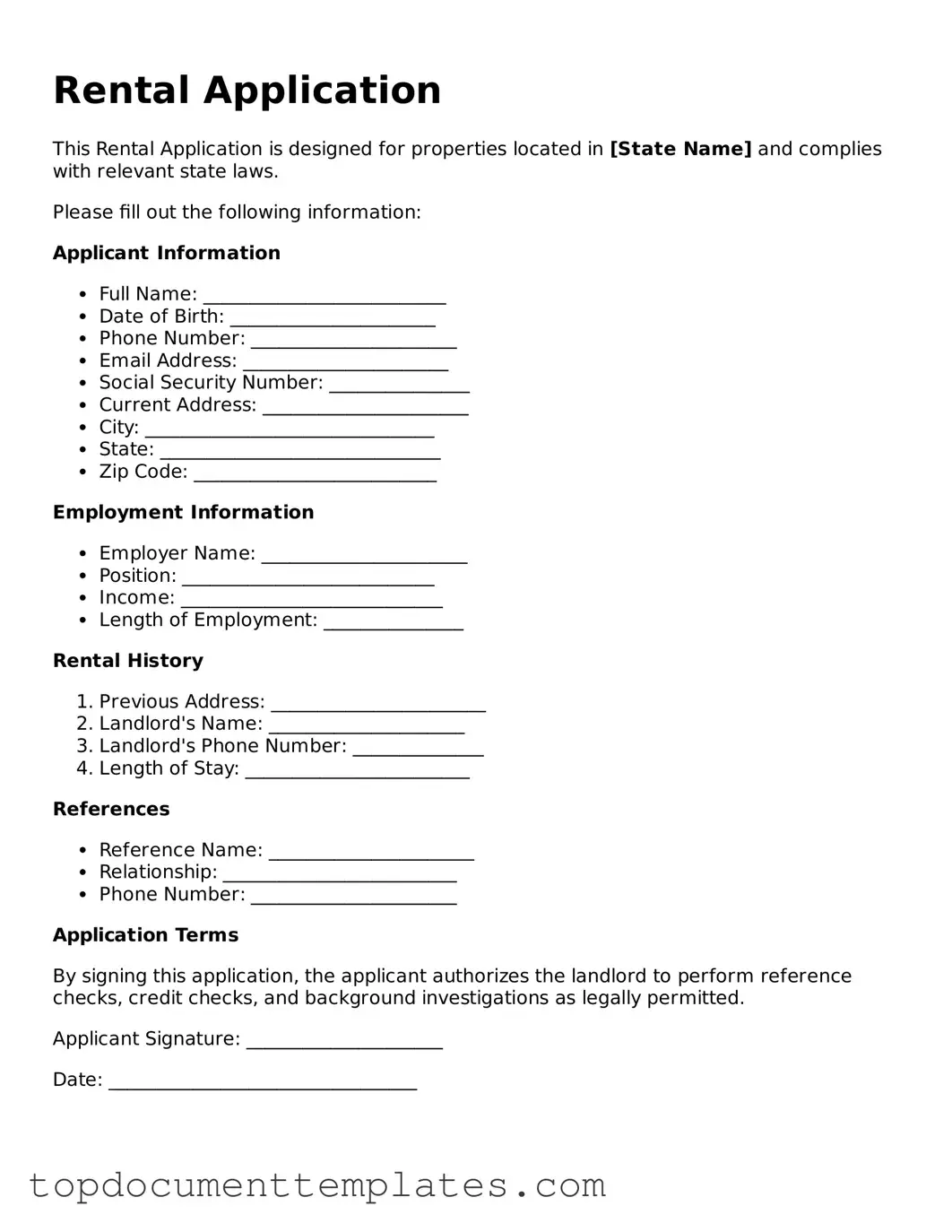Official Rental Application Template
The rental application form serves as a crucial tool for both landlords and prospective tenants, streamlining the process of finding suitable housing. This document typically collects essential information, including personal details such as the applicant's name, contact information, and social security number. Additionally, it often requests employment history, income verification, and references to assess the applicant's financial stability and reliability as a tenant. Many forms also include questions about rental history, allowing landlords to gauge past behaviors and experiences. Furthermore, the application may require consent for background and credit checks, providing landlords with a clearer picture of an applicant's financial responsibility. By understanding these key aspects, both parties can navigate the rental landscape more effectively, ensuring that the process is fair and efficient.
Similar forms
- Lease Agreement: Like a rental application, a lease agreement outlines the terms and conditions of renting a property. Both documents require personal information and detail responsibilities of the tenant and landlord.
- Tenant Screening Consent: This document is similar to a rental application as it authorizes landlords to conduct background checks. It collects personal information, including social security numbers and employment history.
- Rental History Verification: A rental history verification form is comparable to a rental application. It seeks to confirm past rental experiences, often requiring contact information for previous landlords and details about the rental duration.
- Employment Verification Form: This form is similar because it provides proof of income and employment status. Both documents help landlords assess a tenant's ability to pay rent consistently.
- Co-signer Agreement: A co-signer agreement shares similarities with a rental application. It includes personal information and financial details about the co-signer, ensuring that they can cover the rent if the tenant fails to do so.
- Pet Application: A pet application is akin to a rental application as it gathers information about pets that a tenant wishes to bring into a rental property. It often requires details about the pet's breed, size, and vaccination status.
Rental Application - Tailored for State
Guidelines on Writing Rental Application
Filling out a rental application is an important step in securing a rental property. Once completed, you will submit the form to the landlord or property manager for review. They will assess your application based on the information you provide, which will help them determine your eligibility as a tenant.
- Begin by entering your full name in the designated section at the top of the form.
- Provide your current address, including the street name, city, state, and zip code.
- List your phone number and email address for contact purposes.
- Fill in your date of birth to verify your age.
- Indicate your employment status by selecting the appropriate option (employed, unemployed, student, etc.).
- Enter your employer's name, address, and your job title if you are currently employed.
- Include your monthly income to give the landlord an idea of your financial stability.
- Provide references, including previous landlords or personal references, along with their contact information.
- Answer any questions regarding your rental history, such as previous addresses and reasons for leaving.
- Sign and date the application to confirm that all information is accurate and complete.
After completing the application, review it for any errors or missing information before submitting it. This will help ensure a smooth review process by the landlord or property manager.
File Information
| Fact Name | Description |
|---|---|
| Purpose | The Rental Application form is used by landlords to collect information about potential tenants. It helps assess the applicant's suitability for renting a property. |
| Information Collected | This form typically gathers personal details such as the applicant's name, contact information, employment history, and rental history. |
| Background Checks | Landlords often use the information provided to conduct background checks, which may include credit history and criminal background checks. |
| State-Specific Laws | In many states, the use of rental applications is governed by landlord-tenant laws. For example, in California, the California Civil Code Section 1950.6 outlines rules regarding application fees and disclosure requirements. |
| Application Fees | Landlords may charge a fee to process the application. However, the amount and conditions for this fee can vary by state, and some states have caps on the fees that can be charged. |
Find Other Types of Rental Application Templates
Simple Rental Agreement Between Family Members - The lease includes start and end dates to clarify the rental period.
